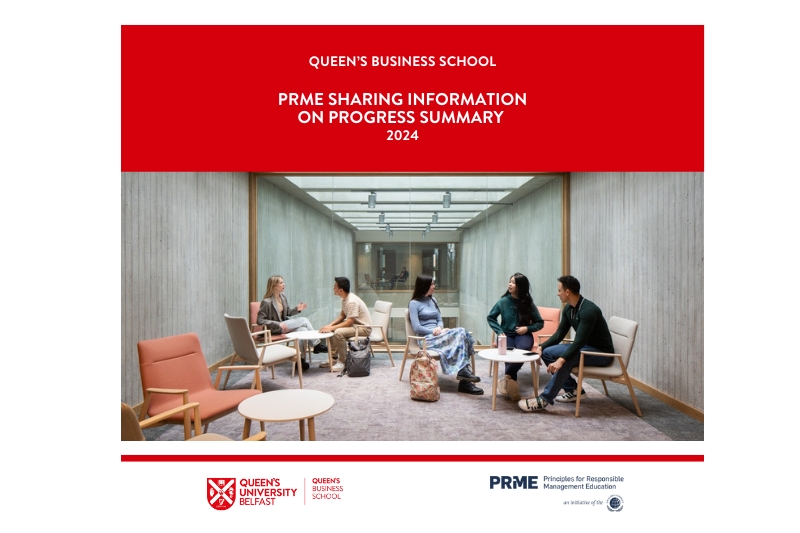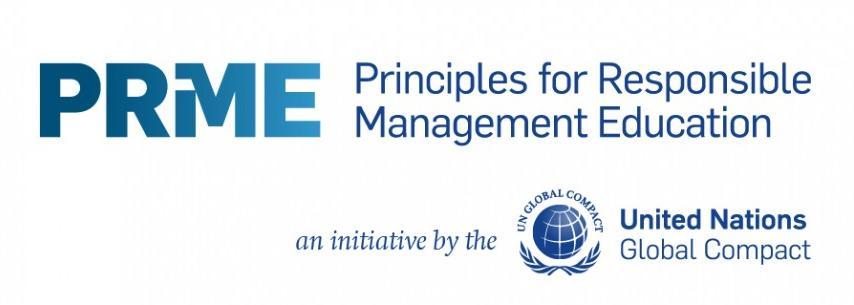PRME
The Principles for Responsible Management Education (PRME) is a United Nations-supported initiative established in 2007 that aims to raise the profile of sustainability in business and management education through Seven Principles focused on serving society and safeguarding our planet.
PRME engages business and management schools to ensure they provide future leaders with the skills needed to balance economic, environmental, and social goals, while drawing attention to the UN Sustainable Development Goals (SDGs) and aligning academic institutions with the work of the UN Global Compact. Driven by its mission to transform management education, PRME equips today's business students with the understanding and ability to deliver change tomorrow.
The Principles of PRME, as well as those of the UN Global Compact, offer a framework for continuous improvement in business practices and education focused on fostering sustainability and ethical conduct. These principles guide organisations toward achieving the SDGs. As a voluntary initiative with over 850 signatories worldwide, PRME has become the largest organised relationship between the United Nations and management-related higher education institutions.
Queen’s Business School and PRME
In 2017, Queen’s Business School proudly became a signatory to PRME and, since 2020, we have served as a PRME Champion institution. This reflects our commitment to demonstrating thought and action leadership on responsible management education in the context of the UN sustainable development agenda.
QBS is actively involved in the UK and Ireland Chapter of PRME. This has included developing and delivering an “onboarding” initiative for new PRME Leads, organising a series of workshops designed to support Signatories in preparing their PRME SIP reports, and establishing a Seed Funding Competition for Developing Innovative Pedagogic Approaches and Teaching Practices in PRME with colleagues from Lincoln International Business School and Leeds University Business School.
Our Director of Ethics, Responsibility, and Sustainability & PRME Lead, Dr Laura Steele, was elected to the PRME Chapter UK & Ireland Steering Committee in June 2022, where she serves as Vice-Chair, Co-Lead for Organisational Learning and SIP Reporting, and Co-Lead for the PRME Island of Ireland (IoI) Local Network.
In 2025, we were delighted to host the PRME Chapter UK & Ireland Annual Conference and Doctoral Colloquium. You can read more about the event here.

A core commitment of all PRME Signatories is the regular preparation and publication of a Sharing Information on Progress (SIP) report.
The SIP report is an important accountability and transparency mechanism, demonstrating the institution's efforts to implement the Principles of PRME. In addition, it can help to facilitate stakeholder dialogue and engagement, as well as support mutual learning amongst current and potential PRME members.
Two of our SIP reports have been recognised for excellence at the PRME Global Forum (2019 & 2021). You can view our SIP reports to date via the PRME website. In addition, you can download QBS PRME SIP Summary 2024. This document provides as succinct overview of our work related to PRME, as well as insights from faculty and professional services staff at QBS.
Drawing upon our recognised experience in PRME SIP reporting, Queen’s Business School developed and delivers PRME SIP webinars and workshops to support other business schools in the UK, Ireland, and beyond in developing effective, impactful reports. For more information and resources, please click here.

Queen’s Business School has served as a PRME Champion since 2020.
PRME Champions are a select cohort of highly engaged PRME signatory institutions recognised for effectively embedding responsible management and sustainability principles across their operations – particularly within curriculum, research, partnerships, and organisational practices.
The mission of the PRME Champions group is to act as thought and action leaders driving the implementation of sustainable development in management education. Champions collaborate internally and across the broader PRME community to transform business education in alignment with the UN SDGs. They seek to develop and pilot “game-changing” initiatives, serve as ambassadors and mentors within the PRME network, and co-develop frameworks and tools that benefit the global PRME community.
For more information about PRME Champions initiative, please click here.
PRME Chapter UK & Ireland Innovative Pedagogy Competition
The PRME Chapter UK & Ireland Innovative Pedagogy Competition is an annual initiative that celebrates outstanding teaching practices aligned with PRME. It was developed and launched in 2019-2020 by Dr Laura Steele, Queen's Business School, Dr Claire May, Lincoln International Business School, and Dr Matthew Davis, Leeds University Business School. The competition is currently Co-Led by Laura and Claire.
The competition aims to identify and showcase pedagogical innovations that advance sustainability, ethics, and responsible leadership in business and management education. Open to educators across the UK and Ireland, the competition encourages creative, impactful approaches that foster student engagement and global citizenship. Winners gain recognition within the PRME community and have opportunities to present their work at academic forums, contributing to a shared commitment to transforming business education for a better world.
Visit the PRME Chapter UK & Ireland website for more information about the competition, as well as resources developed by the winners.

